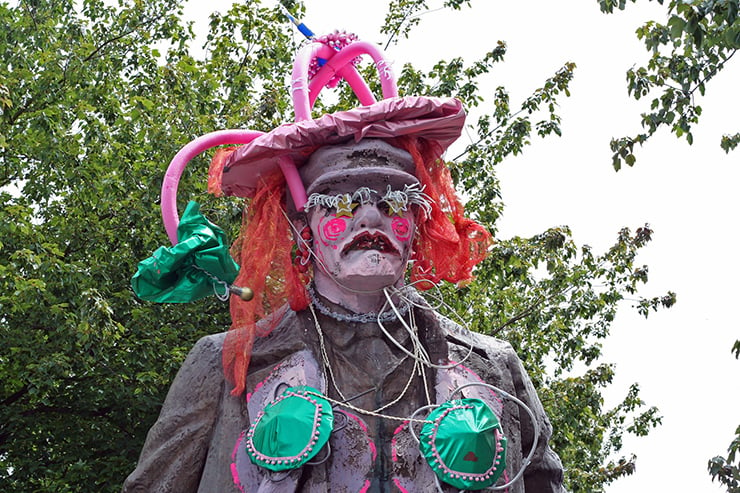In an April 1980 address by Adam B. Ulam, the distinguished Harvard University professor of Russian history, listeners heard what by then was a conventional view, namely that Lenin was the most influential political figure of the 20th century. Unlike others who reached the same conclusion even earlier, Ulam was not celebrating the creator of the Soviet dictatorship. He was merely expressing a then-common view about Lenin’s successful revolutionary activity providing a model for other Marxist revolutionaries throughout the world. Moreover, Lenin’s admirers included not only leftist revolutionaries like Che Guevara, Ho Chi Minh, Fidel Castro, and Mao. They also numbered fascist and protofascist thinkers like the French exponent of redemptive violence, George Sorel, and the young Mussolini as he was groping his way toward the revolutionary Right.
The question is whether, on the 100-year anniversary of this death this month, the man who led the Bolshevik takeover of Russia in November 1917 has retained his exemplary role as a social revolutionary down to the present time. In “Lenin’s Tomb” in the January issue of Chronicles, Christopher Sandford argues forcefully that Lenin still exerts influence within the left today, especially among those who still rightly or wrongly call themselves “Communists.” Lenin has been reduced to a minor figure in our changing political climate; it would not be surprising if he became even less significant outside of Russia in the future. For one thing, Communism, as opposed to its successor leftist ideology, which is wokeness, has become mostly passé. Even if we persist in designating the brutal nationalist dictatorship in China as a “Communist” regime, which it is technically, specifically Marxist revolutions seem more and more confined to political backwaters like Venezuela. The monumental contest between the capitalist West and a vast Communist empire, over whose beginnings Lenin presided, clearly belongs to the past.
For another thing, Lenin, as an historical figure, has no real purchase with our now-predominant left, which is being shaped by those Dave Chappelle aptly styled the Alphabet People. In a West dominated by girly government heads such as Justin Trudeau, Barack Obama, Olaf Scholz, and various LGBTQ world leaders, Lenin was much too virile a historical figure to remain politically relevant, certainly not on the left. The will to power exhibited by Lenin in seizing control over Russia and the cult of personality that followed him are hardly qualities that would appeal to the woke left. It’s not that our own left believes in anachronisms like constitutional government and due process for dissenters any more than did Lenin. The problem is our left doesn’t believe in masculinity, particularly not for white people, and Lenin, whatever his faults, was a very masculine white man. He also took power in a European country, not in a Third World hellhole. And whether or not one likes his ruthless behavior, he belongs in Thomas Carlyle’s pantheon of dominant historical personalities rather than at an international conference for climate change or at a meeting of American academics called to discuss the removal of gender-specific pronouns.
That Lenin still has his fans in Russia and that his embalmed corpse is still exhibited in Moscow should come as no surprise. Unlike woke mobs in the United States and their political defenders, Russians do not cancel their onetime heroes, even if they no longer find their views fashionable. I would not expect Russian social justice warriors to seize Lenin’s embalmed corpse and throw it into a garbage can. But even more importantly, many Russians may continue to view the Communist dictator as some kind of significant national leader, who helped his country survive after its disastrous involvement in World War I.
Lenin’s importance to Russians may have been similar to that of Mustafa Kemal Atatürk to Turks. Atatürk took power in Turkey at around the same time and enabled the Turkish nation to survive after being territorially dismembered by 1919. Nations look up to national leaders who are viewed as helping them survive in times of great crisis. This explains the cults that have been erected to a wide variety of national saviors, including Lincoln, Churchill, Napoleon, and Peter the Great. To whatever extent Lenin still enjoys popularity in his home country, it may be possible to see this as the reason.
In any case I can’t imagine myself today having the conversation about Lenin that I did with older colleagues at Case-Western Reserve University in 1969. At that time, I was browbeaten for not recognizing like most Third World leaders as well as my politically engaged colleagues that Lenin was the greatest man of the century. Today the spiritual descendants of those academics would be swooning over Ibram X. Kendi, Greta Thunberg, and Claudine Gay. One needn’t like the old leftist heroes to recognize that those who have replaced them are viscerally more contemptible.

Leave a Reply